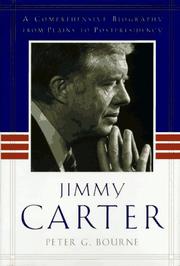Check nearby libraries
Buy this book

He is known as the Great Peace Maker, a man whose humanitarian ideals prompt his diplomatic intervention in places like Haiti, North Korea, Bosnia, the Middle East. Whether negotiating a cease-fire in shell-shocked Sarajevo or building houses for the homeless in Appalachia, Jimmy Carter can be found at the helm of a vast array of humanitarian efforts.
An annual nominee for the Nobel Peace Prize, he embodies the qualities that the American public mourns having lost in its politicians: integrity, honesty, ethics, and dedication.
Yet Jimmy Carter, thirty-ninth president of the United States, is curiously apolitical. Despite his two diligent battles for the governorship of Georgia (he succeeded in 1970) and his "coup d'etat" election to the presidency in 1976, his was always less a political agenda than a moral one. He saw the office as a vehicle for constructive change, propelled by firm and very Christian convictions about right and wrong.
To understand James Earl Carter, one must understand his upbringing, his faith, his unwavering beliefs. Peter Bourne traces Carter's dogma to its roots in Plains, Georgia, deep in the Baptist South, where the imbalanced society created by inherited wealth and segregation could not suppress the everyman farm worker who held dear the tenets of social justice and strove toward the highest goals. Tenacity and self-confidence would propel Carter from the Naval Academy to the governorship to the presidency.
Along the way, he remained devoted to Rosalynn and his family, to his religion, and to the ideology that the state and government have a responsibility to create a better society. As Bourne reveals, there would be no need for Carter to "reinvent" himself after public office.
James Earl Carter went on to build houses for Habitat for Humanity; to create the Carter Presidential Center to focus on international conflict resolution, the Global 2000 program to reduce hunger and disease in Africa, and the Atlanta Project to address the most intractable inner city problems, all out of devotion to his life-long convictions.
Jimmy Carter provides an insightful, intimate, and frank portrayal of the thirty-ninth president of the United States from a close friend and advisor of more than twenty-five years.
Check nearby libraries
Buy this book

Previews available in: English
Subjects
Presidents, Biography, Carter, jimmy, 1924-People
Jimmy Carter (1924-)Places
United States| Edition | Availability |
|---|---|
|
1
Jimmy Carter: a comprehensive biography from Plains to post-presidency
1997, Scribner
in English
0684195437 9780684195438
|
aaaa
|
Book Details
Edition Notes
Includes bibliographical references and index.
"A Lisa Drew book."
Classifications
The Physical Object
ID Numbers
Community Reviews (0)
Feedback?History
- Created April 1, 2008
- 15 revisions
Wikipedia citation
×CloseCopy and paste this code into your Wikipedia page. Need help?
| August 6, 2024 | Edited by MARC Bot | import existing book |
| March 17, 2024 | Edited by ImportBot | import existing book |
| March 8, 2023 | Edited by MARC Bot | import existing book |
| December 10, 2022 | Edited by ImportBot | import existing book |
| April 1, 2008 | Created by an anonymous user | Imported from Scriblio MARC record |









